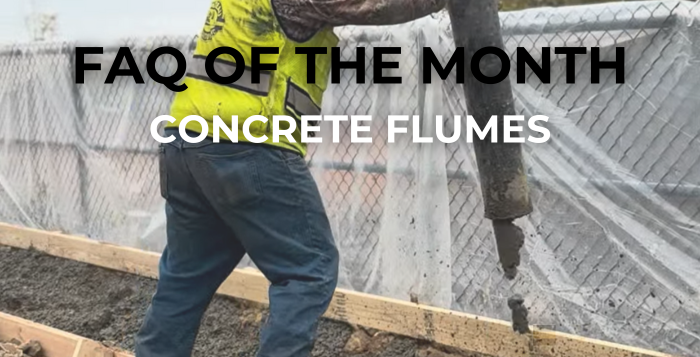Plateau Excavation

FAQ Friday: What Are Concrete Flumes and Why Are They Important?
Welcome to this week’s FAQ Friday! Today, we’re talking about concrete flumes—a vital component in water management systems. These structures play an essential role in controlling and directing the flow of water, making them crucial in the construction industry.
What is a Concrete Flume?
A concrete flume is a specially designed structure made of concrete that is used to transport or direct water in an efficient and controlled manner. It is essentially a channel or trough, and it can be found in various sizes and shapes depending on the specific needs of the site.
These flumes are designed with specific flow characteristics in mind, allowing for the precise measurement and regulation of water flow. They often come with a V-shaped, U-shaped, or rectangular cross-section, and are built to withstand both environmental factors and heavy water flows without losing shape or efficiency.
How Do Concrete Flumes Work?
Concrete flumes work by guiding water from one place to another while ensuring minimal disruption to the natural flow of water. In many cases, the flumes are used to measure the velocity and volume of water that passes through them. This makes them highly valuable for monitoring water usage and drainage systems.
In a construction setting, a concrete flume helps direct water away from sensitive areas, such as building foundations, roadways, and heavy equipment zones, preventing water from washing out materials or undermining the stability of structures in progress. By channeling the water into designated areas or drainage systems, the flume helps maintain site safety and construction timelines.
Why Are Concrete Flumes Important?
Concrete flumes play a vital role in water management, and here are a few key reasons why they are so important:
Efficient Water Flow Management
Concrete flumes are designed to handle large volumes of water efficiently. They ensure that water is transported without spilling, flooding, or causing erosion. By controlling water flow, flumes help prevent water loss and infrastructure damage, ensuring that water resources are used sustainably.
Accurate Flow Measurement
Flumes are commonly used in applications where monitoring the flow rate of water is critical. Whether it’s for agriculture, waste treatment, or municipal water systems, concrete flumes provide a reliable means of measuring water flow, which helps optimize water distribution and ensures systems function as intended.
Durability and Longevity
Concrete is an extremely durable material, making concrete flumes long-lasting and reliable. Unlike other materials, concrete is resistant to wear and tear caused by flowing water, extreme weather conditions, or environmental stress. This makes it an ideal material for building water channels that need to stand up to heavy use over many years.
Flood Prevention
In flood-prone areas, concrete flumes can help manage water overflow. Without a flume system in place, bad weather conditions can quickly overwhelm drainage systems, causing water to spill over and erode the surrounding landscape.
Environmental Benefits
Concrete flumes can be built in such a way that they help protect the environment. For instance, they can be used in controlled water releases for reservoirs or irrigation, reducing the risk of soil erosion and preserving natural water sources. Additionally, these structures can help reduce the need for chemical treatments or excessive water pumping in agriculture.